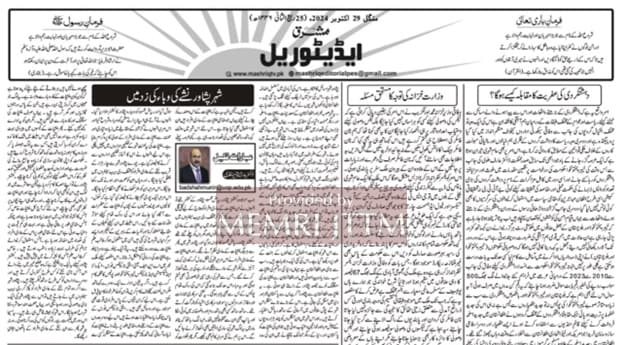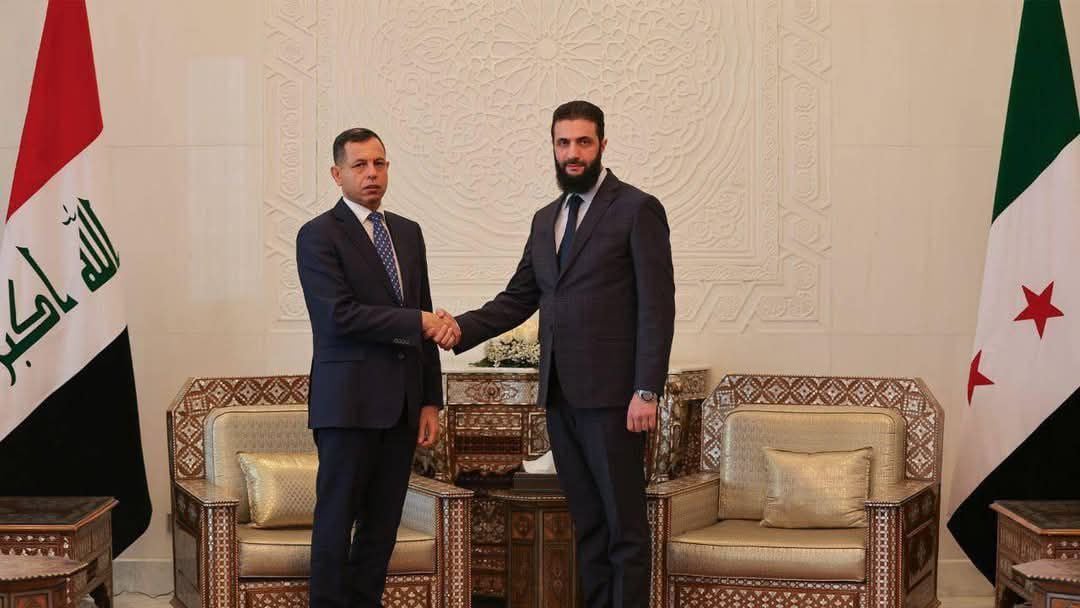The following report is now a complimentary offering from MEMRI's Jihad and Terrorism Threat Monitor (JTTM). For JTTM subscription information, click here.
In a recent editorial, Pakistan's leading Urdu daily Roznama Mashriq warned that the increasing terror attacks in the Khyber Pakhtunkhwa and Balochistan provinces of Pakistan are fueled by jihadi terrorists obtaining modern weapons left by the U.S. and NATO forces in Afghanistan.
The editorial also says that these weapons are being sold in several regions of Afghanistan and facilitated by the ruling Afghan Taliban officials. "They were also bound under the Doha Agreement [to ensure] that the modern weapons and other equipment do not fall into the hands of terrorists," it noted, expressing concern that the Taliban regime is not stopping cross-border terror attacks in Pakistani provinces.

The editorial page of Roznama Mashriq
Following is a translation of the Urdu-language editorial:
"After The Growing Incidents Of Terrorism Over The Past Two And Half Years Have Damaged Peace Efforts, The Perception Is Strengthening That The Government Writ Is Weakening In Khyber Pakhtunkhwa And Balochistan With Each Passing Day"
"How The Demon of Terrorism Can Be Combatted
"The issue is: to deal with problems that emerged following the increasing incidents of terrorism, there is a lack of harmony between the state and different segments of the public. One reason for this is the organized propaganda by various groups against federal security agencies. The other reason is the state's failure to take action against the ideologically like-minded people and their financial facilitators in accordance with the country's laws.
"The general public is concerned that, despite considerable time having passed, no Joint Investigation Team (JIT) or inquiry commission has been formed to investigate the release of convicted terrorists and people involved in serious crimes, as well as the strategy and the motives behind the resettlement of a large number of terrorists by former President Dr. Arif Alvi in the name of the Kabul Negotiations at the request of the Khyber Pakhtunkhwa government at the time. Similarly, no notice was taken against those who used Afghan refugees in local politics.
"On the other hand, after the growing incidents of terrorism over the past two and half years have damaged peace efforts, the perception is strengthening that the government writ is weakening in the Khyber Pakhtunkhwa and Balochistan with each passing day. Just as the need for national harmony doubles, it is nowhere in sight. It is not enough to say that the two provincial governments (Khyber Pakhtunkhwa and Balochistan) showed laxity in discharging their responsibilities. It may be right to some extent, but not completely.
"However, the Khyber Pakhtunkhwa government should be asked: in which areas the large funds of approximately Rs. 500 billion provided by the federal government for anti-terrorism efforts between 2010 and 2023 were used? This question is also important because the police forces in Balochistan and especially in Khyber Pakhtunkhwa – the most terror-affected region – are neither equipped with sophisticated weapons nor trained in modern methods while various terrorist groups have taken advantage of the advanced weapons markets in Afghanistan, obtained modern arms and other defense equipment left behind by the U.S. and NATO allies..."
"Since The Withdrawal Of [The U.S.-Led NATO] Coalition, The Sale Of Modern Weapons, Besides Other Equipment Which Helps In Armed Activities, Has Been Openly Continuing In Afghanistan"
"Since the withdrawal of [the U.S.-led NATO] coalition, the sale of modern weapons, besides other equipment which helps in armed activities, has been openly continuing in Afghanistan. It was the responsibility of the Afghan transitional [Taliban] government to ensure that the weapons left behind by the coalition... should not fall into the hands of state and non-state actors. They were also bound under the Doha Agreement [to ensure] that the modern weapons and other equipment do not fall into the hands of terrorists so that a new wave of terrorism may not begin in the region.
"Unfortunately, the sale of the weapons and other equipment left behind by the U.S. and its allies still continues under the supervision of the warlords of the Afghan [Taliban] government. This bitter truth has emerged in dozens of cases [of terrorists arrested] here: that the terrorists used weapons and other equipment left behind by the U.S. and its allies.
"Last year, the United Nations and the U.S. itself confirmed that different terrorist groups in Afghanistan have acquired modern weapons and other equipment from the illegal arms market spread from [Afghanistan's eastern city of] Jalalabad to [the western city of] Herat due to which the new wave of terrorism in the region has revived, affecting Pakistan the most.
"The issue is that the analysis of the situation that emerged following the weapons' being used in terror incidents over the past two and half years, confirms that these weapons could not reach the outlawed TTP [Tehreek-e-Taliban Pakistan] and other terrorist groups without the consent and patronage of the Afghan transnational government.
"Anyway, in the light of the aforementioned facts... anti-terrorism cooperation between the federal and provincial governments needs to be expanded. Secondly, effective steps should be taken for confidence-building between the state and different segments of the people so that, like in the past, the government and the people can unify and combat this demon and exemplary peace can be established in Pakistan because without the establishment of exemplary peace, achieving the goal of development and progress will not be possible by any means..."
The full text of this post is available to subscribers.
Please login or register to request subscription information from MEMRI




